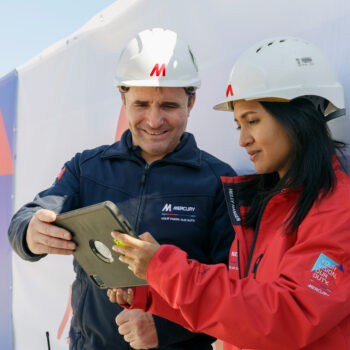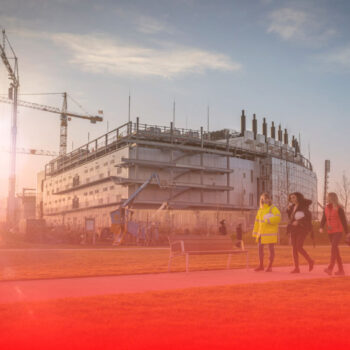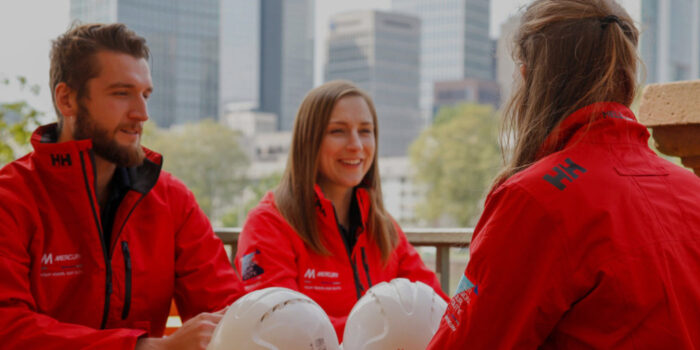News & Insights

Alan Gorman: Sustainability at the project face
Alan Gorman, Managing Director of our Enterprise Data Centres Business Unit, recently gave insight into how his teams are continuously working to implement tangible and more environmentally friendly processes on our project sites across Europe as we continue to set strategies and strive towards achieving our Key Performance Indicators (KPIs) on sustainability.
Read Alan’s full interview below, which details our efforts to implement the use of more electric vehicles on our sites and highlights our efforts to significantly reduce water wastage on data centre projects, and more.
Given that it is not always clear how strategies translate into operational actions on site, can you comment on how your teams are impacting carbon emission reductions on sites?
“When it comes to scope 3 carbon emissions, energy usage and efficiency are key areas of focus for us. We are always looking to source equipment for our sites which are rechargeable as opposed to fossil fuel powered. While it is not always possible to source local suppliers, we have been able to secure an electric-powered 60 metre radius mobile tower crane, with a 10,000 kg rating on one of our projects in the Netherlands.”
“This may be just one example, but ultimately it all adds up in our efforts to lower GHG emissions from operations on site. Mercury has also reached an agreement with Volkswagen Europe to supply a fleet of hybrid cars for our one German projects. We aim to implement the use of these vehicles on all of our European projects from 2022. The next step in this journey is to look at replacing diesel reliant site equipment such as teleporters, with electric alternatives.”

Water is a scarce commodity and construction sites do use their fair share of water. Can you comment on how you are taking that into account for activities that take place on your projects?
“Beyond compliance with local laws and regulations, we are always looking for ways to improve our methods of operation. Mercury previously used chemicals and water to flush and clean cooling and heating piping systems. Due to the need for treatment chemicals in the water, there was a requirement to flush to drain, or to use a tanker for disposal. As you can imagine, this process is not environmentally friendly or cost effective. Chemical flushing often requires a system to be refilled with up to five times the original volume of water. We are unable to re-use this water and had to use new water with each cycle. A typical data centre piping system can use 200,000 litres of water, meaning that this method often requires the use of one million litres.”
“On one of our Berlin projects we have moved away from this old chemical flush process to include a filtration flushing system whereby we can re-use the same water from the initial fill, saving up to 800,000 litres.”
“This process is efficient and takes no longer than the previous method as there is no requirement to remove components from the piping system and no drain-down and re-fill durations. Feedback from flushing contractors highlights that 75% of our projects now use the filter-flush method which can only have a positive environmental impact on our operations. Mercury is also working alongside our design teams to explore the possibility of omitting the use of inhibitors and biocide chemicals by using stainless steel piping systems and their components which are compatible with reverse osmosis and demineralised water usage.”
Have you made any changes to how you staff projects to achieve a more environmentally friendly outcome?
“Our original approach to projects based on the continent was to fly our staff to their place of work on regular rotations. During the initial stage of the global Covid-19 pandemic, our geo-resilience team reviewed our options. With many of our projects remaining open during the first lockdown – due to their critical infrastructure status – we immediately implemented measures to keep our people safe. While introducing temperature testing, social distancing measures and mask-wearing on our projects, we also considered solutions that would decrease the need for management business trips and staff rotations, while maintaining 100% of our staff and continuing to deliver projects for our clients.
“One example of an action we took as a company to reduce our carbon footprint in terms of travel includes assisting some of our people to relocate their family to the project location.”
“We also focused on hiring more staff locally and some functions where centralised meaning that employees could work from home, while continuing to support projects remotely using our online platforms and tools to incorporate augmented reality with virtual reality to monitor progress and resolve issues. Implementing these measures has contributed to a decrease in our need for business travel to support project execution activities.”
Being responsible with waste removal and recycling practices – can you tell us what projects are doing to ensure diversion from landfill?
“We are currently in the process of setting up a new project in France and there is a waste management plan in place which includes audits that ensure we receive reports from waste removal companies to help us understand the tonnage of various segregated waste groups which are removed from site via skips. This assists us to track and better understand what percentage of our waste is being recycled vs land-filled.”
OUR PLANET, OUR DUTY
We believe that we each have a role to play in contributing to the sustainable development of our planet. With this in mind, we have launched Our Planet, Our Duty, our Responsible Business plan. Our Planet, Our Duty is our promise to help create a more sustainable environment around us. It forms one of the foundation blocks of Beyond50, our five year plan to push further and take Mercury beyond our 50th year in business. Click on the link below to read more.
Like Mercury on Facebook.
Follow us on LinkedIn, Twitter, and Instagram.


